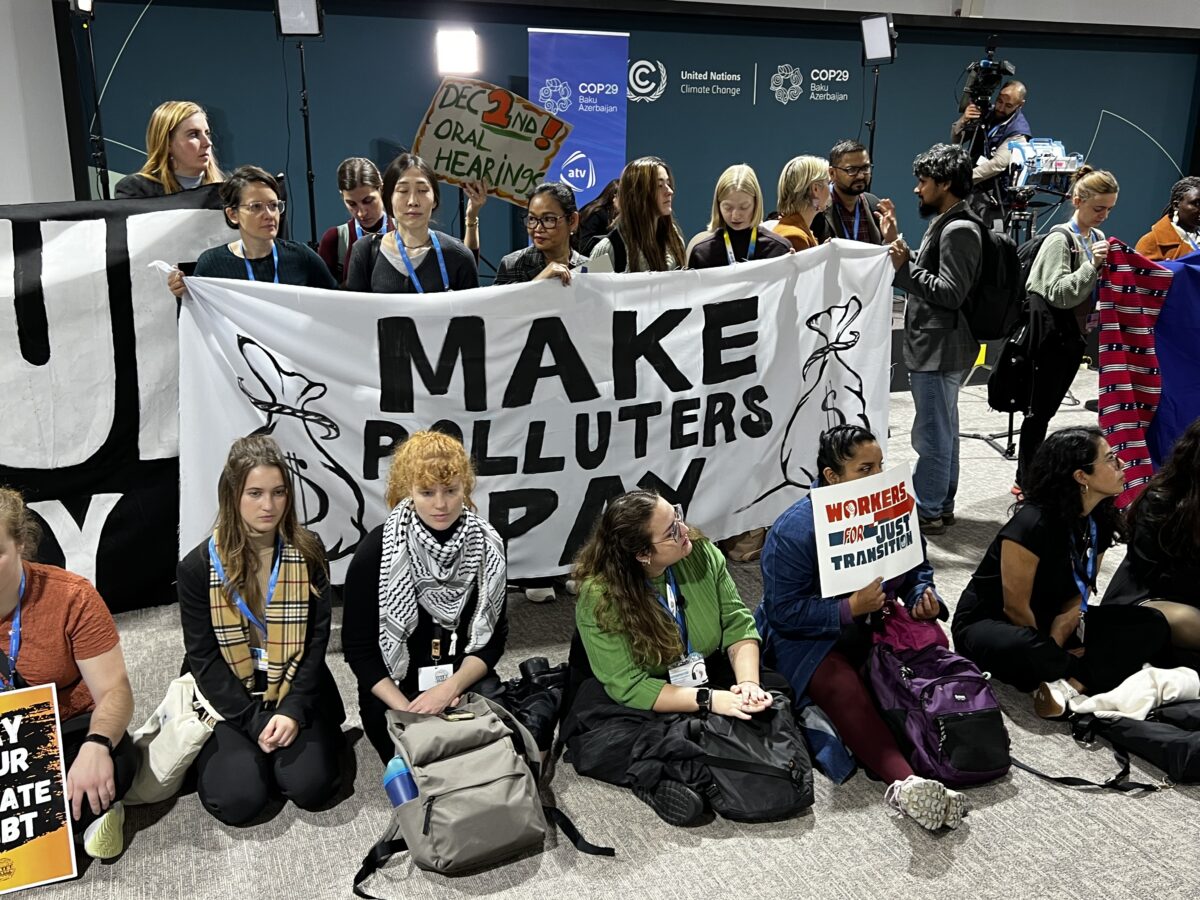The fossil fuel industry’s presence at this year’s UN climate negotiations in Baku, Azerbaijan, has been simultaneously heavy-handed and covert. More than 1,770 lobbyists—including the heads of some major oil and gas corporations—have been granted access to the talks, many as guests of the host country. The numbers dwarf those of almost every country delegation and threaten to drown out the voices of Global South nations—not to mention Indigenous peoples, youth, women and others who disproportionately bear the brunt of climate impacts. The industry’s close access to the leaders of the negotiations raises questions about how COP29 will stay on track toward the goals of increasing much-needed climate finance and following through on a fast, fair transition away from fossil fuels.
Even more alarming, the fossil fuel industry’s influence at COPs is deeply entrenched and goes beyond lobbying. We’ve seen it at COP29 with greenwashing by corporations and trade associations, misrepresentations of what science deems necessary to address the climate crisis, and a widening ambition gap due to the insidious effects of fossil fuel influence.
To help parties break free from the grip of fossil fuel interests, here’s a guide to the top five ways the fossil fuel industry is trying to co-opt climate talks—and a call to world leaders to resist them.
1. Showing strength in numbers
Late last week, the Kick Big Polluters Out coalition revealed that at least 1,773 fossil fuel lobbyists have been granted access to COP29, outnumbering nearly every national delegation attending the talks in Azerbaijan. This is a major presence for the industry primarily responsible for driving destructive and deadly climate change and more than all the delegates from the ten most climate-vulnerable countries combined (1,033 people badged).
According to the provisional list of registered on-site participants, major fossil fuel corporations BP, Chevron, Eni, ExxonMobil, Shell, and TotalEnergies brought a total of 44 lobbyists to COP29. Participating in and influencing COPs has been part of ExxonMobil’s playbook for decades. Darren Woods, the corporation’s chair and CEO, is one of 12 ExxonMobil lobbyists in Baku. By comparison, Guyana—a country vulnerable to floods, droughts, sea-level rise, and other climate impacts (and where ExxonMobil is being sued over its offshore oil extraction projects)—also has 12 representatives at COP29.
2. Obtaining high-level access
But it’s not just the numbers. It’s who’s representing the fossil fuel industry, and who they are consorting with. The heads of several major oil and gas corporations—Aramco, BP, ExxonMobil, TotalEnergies—are included in the provisional registration list as guests of the host country.
ExxonMobil’s Woods showed up at COP29 as a host country guest. He was invited to speak at a high-level meeting convened by the COP Presidency—an unparalleled opportunity to personally cultivate political leaders from around the world and attempt to define the terms of the energy transition in ways that perpetuate reliance on fossil fuel products and grow corporate profits.
Meanwhile, Woods discouraged US President-elect Trump from withdrawing the United States from the Paris climate agreement, saying “The way you influence things is to participate, not to exit.” Ironically, this is one point on which I would agree with ExxonMobil’s CEO—with one significant amendment when it comes to the fossil fuel industry: “The way you influence things UNDULY is to participate…”
3. Refusing to pay up
Climate finance is the top priority for COP29, and one leg of the financial stool is funding for lower income countries to address loss and damage from fossil fuel-driven climate impacts. The year 2024 is on track to be the hottest year on record, with extreme weather events leaving a trail of death and destruction across the globe. While major fossil fuel corporations continue to rake in massive profits, people and communities in the Global South bear a disproportionate burden of these disasters—which is why many in the climate justice movement are campaigning to Make Big Polluters Pay.
 Demonstrators at COP29 calling for industries and corporations that have fueled and continue to worsen the climate crisis to be held liable. Source: Kathy Mulvey/UCS USA
Demonstrators at COP29 calling for industries and corporations that have fueled and continue to worsen the climate crisis to be held liable. Source: Kathy Mulvey/UCS USAAccording to a new report commissioned by the International Chamber of Commerce, climate-related extreme weather events have cost the global economy more than $2 trillion over the past decade. In a painful irony, this is the same International Chamber of Commerce whose delegation to COP29 includes 33 fossil fuel industry lobbyists—and whose US arm pushes the oil and gas industry’s anti-climate agenda. (Read more in this blogpost by my UCS colleague Laura Peterson).
Earlier this year, Azerbaijan, the host country for COP29, announced a Climate Finance Action Fund to be capitalized with $1 billion in voluntary contributions from fossil fuel-producing countries and oil, gas, and coal companies. However, the fund’s launch—set for Climate Finance Day at COP29—has been quietly postponed. The shelving of the fund marks a small victory for advocates who had decried the initiative as a problematic distraction from the imperative for the United States and other wealthy nations— the responsible parties at these UN climate talks—to collectively provide at least $1 trillion per year in grants or very low-interest loans. National and international policymakers must be wary of voluntary approaches that low-ball polluters’ responsibility, risk granting them social license, and could give them inappropriate influence over decisions about how the funds are spent.
4. Conniving to cash in
Even as the fossil fuel industry avoids paying its fair share of the mounting costs of fossil fuel-driven climate harms, fossil fuel subsidies bankrolled by governments (and taxpayers) around the world soared to $7 trillion in 2022, according to the International Monetary Fund.
Here at COP29, ExxonMobil’s Woods added insult to these compounding injuries when he demanded that governments create “incentives” for companies to transition to less carbon-intensive energy sources. The problem: ExxonMobil has its own misleading, dangerous definition of “advancing climate solutions” that its lobbyists are no doubt pitching to COP29 decisionmakers. The corporation’s “low carbon” roadmap relies heavily on technologies such as carbon capture and storage and hydrogen that cannot deliver steep emissions cuts in the critical period between now and 2030. In an interview with The New York Times while he was at COP29, Woods bragged that he resisted investor “pressure to get into the wind and solar business”—and ExxonMobil’s stock soared as the company doubled down on oil and gas.
While fossil fuel industry lobbyists continue their efforts to delay the urgently needed phaseout of oil, gas, and coal, they’re simultaneously trying to co-opt the clean energy transition by demanding subsidies from governments for technologies that aren’t likely to play a material role in meeting 2030 climate targets. Countries must resist any attempt by the fossil fuel industry to swindle funding that should rightly be put toward climate finance desperately needed by nations in the Global South.
5. Greenwashing, diverting attention, and capturing the conversation
During the first week of COP29, I didn’t catch any fossil fuel industry lobbyists in the act of lobbying at the Olympic Stadium where the talks are being held, as such conversations are most likely taking place behind closely guarded doors staffed with security. But the fossil fuel industry’s presence is pervasive and prominent:
- The COP29 Presidency hired Teneo—a public relations firm with close ties to the oil and gas industry—to enhance its image ahead of the talks.
- The Oil and Gas Decarbonization Charter—a voluntary initiative launched at COP28 by oil and gas corporations and condemned by hundreds of civil society organizations as a greenwashing ploy—has predictably resurfaced at COP29 after minimal visibility or progress over the past year.
- Events in the business pavilion have been sponsored by oil and gas corporations including Chevron, ExxonMobil, SOCAR, and TotalEnergies.
I’ve spent hours walking around the pavilions in the Blue Zone, where the official negotiations take place, and the public Green Zone, collecting numerous examples of corporate greenwashing. I’ve seen posters promoting natural gas as “the cleanest of hydrocarbons,” dozens of “net zero” claims, and cartoons touting the deployment of problematic technologies over proven climate solutions.
In the Organization of the Petroleum Exporting Countries (OPEC) pavilion, I found a banner announcing that “oil touches our daily lives in different ways.” In oil-producing regions of the world, that statement is painfully true—people suffer health problems, environmental devastation, displacement, and loss of livelihoods and cultural heritage.
Friday Nbani Barilule, who leads the Lekeh Economic Development Foundation in Nigeria, took the opportunity to share how oil touches his life and that of others in the Niger Delta region where he lives and works. Watch his testimony here and read more in my blogpost about last month’s Niger Delta Climate Change Conference.
Overcoming fossil fuel industry influence with public policies, investor action, and climate litigation
Fossil fuel corporations and their surrogates shouldn’t have a seat at the negotiating table where climate policy is being made. Allowing them access is like setting the cat loose among the pigeons. Corporations such as BP, Chevron, ExxonMobil, and Shell—which have engaged in a decades-long campaign to deceive the public and policymakers and block or delay climate action—have repeatedly shown that they can’t be trusted as good-faith players in climate policymaking.
Even as they continue to exert undue influence over climate policy, major fossil fuel corporations insist that we focus only on governments to advance climate action. Shortly after new evidence emerged that Shell and other oil and gas corporations knew of the planet-heating effects of their products as early as 1954, a Dutch appeals court overturned an earlier order requiring Shell to cut its global warming emissions by 45% by 2030. In celebrating the ruling, Shell urged people to “lobby governments rather than Shell to change policies and bring about a green transition.”
UCS and our allies will continue to lobby governments, and we’ll continue to work with climate-conscious investors to pressure corporations to slash their heat-trapping emissions and align their lobbying with their stated support for the Paris climate agreement. And we recognize the symbiotic relationship between international climate negotiations and climate litigation. UCS’s Science Hub for Climate Litigation is building a community of scientists to help meet the great demand for scientific expertise to inform litigation and legal action around the world.
As the United States and other nations grapple with surging disinformation and drastic anti-climate political change, COP29 has an opportunity to show the world that international diplomacy remains a vital means to address the global climate crisis. As the fossil fuel industry employs a range of strategies to co-opt and derail the process, negotiators must exercise political will to overcome these schemes. We’ll measure world leaders’ success in COP29 decisions that begin to remedy the harms people around the world are already experiencing, accelerate the phaseout of fossil fuels, and fund an equitable global transition to clean energy.

 2 weeks ago
66
2 weeks ago
66


